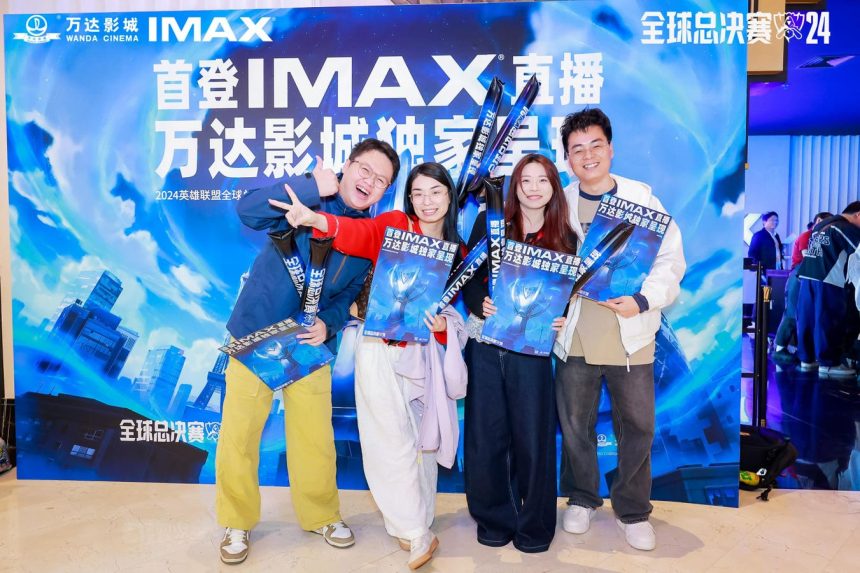IMAX China, the Chinese subsidiary of the renowned North American film technology company IMAX, has navigated a challenging year in 2024, mirroring the broader downturn in the Chinese box office. Ticket sales in China experienced a significant drop, declining 21% compared to the previous year, totaling $5.6 billion. This decline impacted IMAX China’s financial performance, with first-half profits decreasing by 9% and sales sliding by 3.1%. The absence of a major blockbuster hit, in contrast to the previous year, contributed to this downturn. Despite these headwinds, Daniel Manwaring, CEO of IMAX China, remains steadfastly optimistic about the future of the Chinese entertainment market.
Manwaring’s optimism stems from several key factors. First, he anticipates the resurgence of blockbuster movies following a period of pandemic-induced lull and disruptions caused by the Hollywood strike. He believes that the upcoming Chinese New Year holiday, a crucial period for the film industry, will be a catalyst for this resurgence, with highly anticipated releases like “Ne Zha 2” and “Creation of the Gods 2” poised for success. These films represent sequels to previous box office triumphs, suggesting strong potential for attracting large audiences. Second, Manwaring points to the expanding breadth of content being embraced by IMAX theaters in China. This diversification extends beyond traditional Hollywood and Chinese blockbusters to encompass live events such as concerts and gaming tournaments, broadening the appeal of the IMAX experience. Third, Manwaring expresses deep confidence in the pool of talented Chinese storytellers, highlighting their capacity to create compelling narratives that resonate with both domestic and international audiences.
This optimism appears to be shared by investors, as evidenced by the 15% increase in IMAX China’s share price over the past year. This positive market response underscores a belief in the company’s long-term growth prospects within the Chinese entertainment landscape. IMAX’s journey in China began in the 1990s, initially focusing on educational documentaries in collaboration with government partners. This early foray laid the foundation for the company’s subsequent expansion and eventual public listing on the Hong Kong Stock Exchange in 2015. While the company faced challenges during the Covid pandemic, including a failed delisting attempt, Manwaring’s leadership and strategic vision have helped steer IMAX China toward renewed growth and profitability.
Manwaring’s personal connection to China dates back to 2006, driven by a fascination with the Chinese language and the country’s dynamic economic growth. His background in finance and Mandarin led him to pursue various ventures in China, including founding an auto parts business and working in the finance sector. However, his true passion lay in the entertainment industry, and he subsequently joined Creative Artists Agency (CAA), where he played a pivotal role in representing emerging Chinese filmmakers, writers, and actors. This experience solidified his belief in the power of Chinese storytelling and its potential to reach global audiences. Manwaring’s deep immersion in the Chinese film industry culminated in his marriage to Zhang Mo, the daughter of acclaimed filmmaker Zhang Yimou, further strengthening his ties to the creative community.
Manwaring’s firsthand experience with the transformative power of IMAX, exemplified by his memory of waiting in line for “Avatar” in 2009, solidified his conviction in the company’s potential. He views IMAX as a vital force in attracting audiences back to theaters, emphasizing its unique ability to create immersive experiences that transcend traditional cinema. This belief underscores his commitment to expanding the scope of content offered in IMAX theaters, encompassing not only blockbuster films but also live events and alternative forms of entertainment. This diversification strategy aims to engage new demographics and cultivate a broader audience base for the IMAX format.
Under Manwaring’s leadership, IMAX China has witnessed a resurgence in profitability, with profits more than doubling in 2023 compared to the previous year. This financial turnaround reflects the success of his strategic initiatives, including the increased focus on Chinese-language films and the expansion into new content categories. Looking ahead, Manwaring anticipates a continued revival of the blockbuster genre, driven by the return of major Hollywood productions and the growing strength of Chinese filmmaking. He sees the success of films like “Gladiator 2” and “Wicked” as indicators of the enduring appeal of big-screen spectacles, bolstering his confidence in the future of the cinematic experience.
Furthermore, Manwaring highlights the growing acceptance of diverse content formats within IMAX theaters. The successful live broadcast of the “League of Legends” gaming tournament finals, with high attendance and occupancy rates, demonstrates the potential of attracting new audiences through non-traditional events. Similarly, the enthusiastic reception of Taylor Swift’s concert film underscores the appeal of live music experiences in the IMAX format. By introducing new audiences to the immersive qualities of IMAX through these alternative events, Manwaring aims to cultivate a broader appreciation for the technology and encourage future attendance for film screenings.
Manwaring also acknowledges the transformative potential of artificial intelligence (AI) in the film industry. He views AI as a valuable tool that can enhance various aspects of filmmaking, from script development and production to post-production processes. However, he emphasizes that AI should be seen as an assistive technology rather than a replacement for human creativity. He believes that AI can empower filmmakers and enhance their efficiency, ultimately benefiting the industry as a whole. Moreover, Manwaring anticipates that advancements in technology will enable filmmakers to better understand and cater to evolving audience tastes, particularly in the dynamic Chinese market. He embraces this ongoing evolution of audience preferences as an exciting challenge and opportunity for the entertainment industry.



